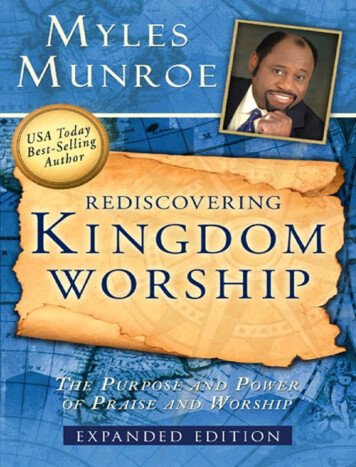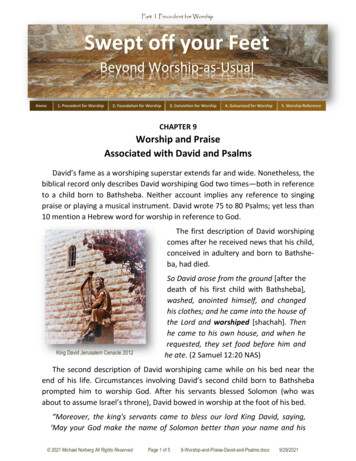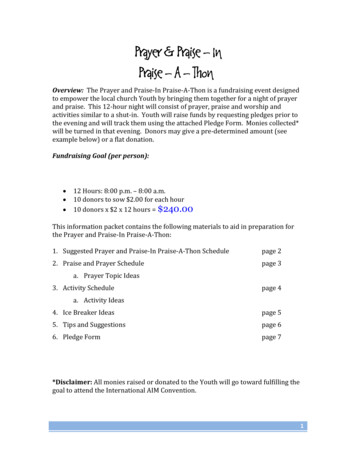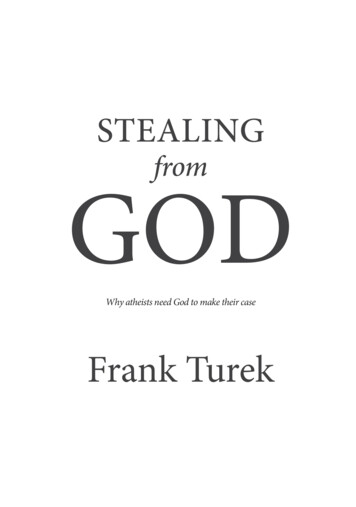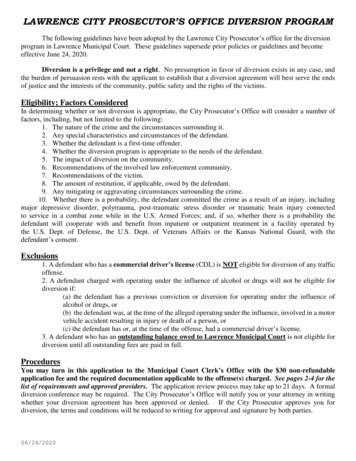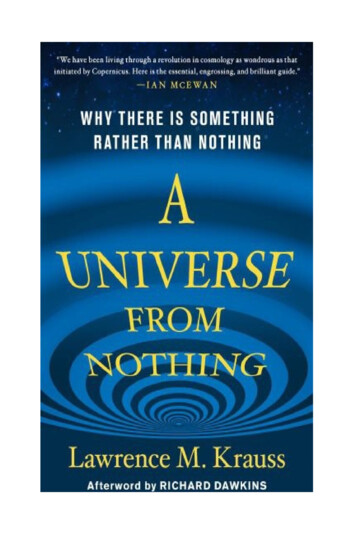
Transcription
PRAISE FORA UNIVERSE FROM NOTHING"In A Universe from Nothing, Lawrence Krauss has written athrilling introduction to the current state of cosmology-thebranch of science that tells about the deep past and deeperfuture of everything. As it turns out, everything has a lot todo with nothing-and nothing to do with God. This is abrilliant and disarming book. "-SAM HARRIS,author of The Moral Landscape"Beautifully navigating through deep intellectual waters,Krauss presents the most recent ideas on the nature of ourcosmos, and of our place within it. A fascinating read. "-MARIO LIVIa,author of The Golden Ratio"A series of brilliant insights and astonishing discoverieshave rocked the universe in recent years, and LawrenceKrauss has been in the thick of them. With his characteristicverve, and using many clever devices, he ' s made thatremarkable story remarkably accessible. The climax is a boldscientific answer to the great question of existence: Why isthere something rather than nothing?"-FRANK WILCZEK,Nobel Laureate and authorof The Lightness of Being"In this clear and crisply written book, Lawrence Kraussoutlines the compelling evidence that our complex cosmoshas evolved from a hot, dense state and how this progress hasemboldened theorists to develop fascinating speculationsabout how things really began. "-MARTIN REES,author of Our Final Hour
"With characteristic wit, eloquence, and clarity LawrenceKrauss gives a wonderfully illuminating account of howscience deals with one of the biggest questions of all: Howcould the universe ' s existence arise from nothing? It is aquestion that philosophy and theology get themselves into amuddle over, but that science can offer real answers to, asKrauss ' s lucid explanation shows. Here is the triumph ofphysics over metaphysics, reason and enquiry overobfuscation and myth, made plain for all to see: Krauss givesus a treat as well as an education in fascinating style. "-A. C. GRAYLING,author of The Good Book
"WHERE DID THE UNIVERSE COME FROM?WHAT WAS THERE BEFORE IT? WHAT WILL THEFUTURE BRING? AND FINALLY, WHY IS THERESOMETHING RATHER THAN NOTHING?"Lawrence Krauss ' s provocative answers to these and othertimeless questions in a wildly popular lecture now onYouTube have attracted almost a million viewers. The last ofthese questions in particular has been at the center ofreligious and philosophical debates about the existence ofGod, and it ' s the supposed counterargument to anyone whoquestions the need for God. As Krauss argues, scientistshave, however, historically focused on other, more pressingissues-such as figuring out how the universe actuallyfunctions, which can ultimately help us to improve thequality of our lives.Now, in a cosmological story that rivets as it enlightens,pioneering theoretical physicist Lawrence Krauss explainsthe groundbreaking new scientific advances that turn themost basic philosophical questions on their heads. One of thefew prominent scientists today to have actively crossed thechasm between science and popular culture, Krauss revealsthat modern science is addressing the question of why thereis something rather than nothing, with surprising andfascinating results. The staggeringly beautiful experimentalobservations and mind-bending new theories are alldescribed accessibly in A Universe from Nothing, and theysuggest that not only can something arise from nothing,something will always arise from nothing.With his characteristic wry humor and wonderfully clearexplanations, Krauss takes us back to the beginning of thebeginning, presenting the most recent evidence for how ouruniverse evolved-and the implications for how it 's going toend. It will provoke, challenge, and delight readers as it looksat the most basic underpinnings of existence in a whole newway. And this knowledge that our universe will be quitedifferent in the future from today has profound implications
and directly affects how we live in the present. As RichardDawkins has described it: This could potentially be the rnaturalism since Darwin.A fascinating antidote to outmoded philosophical andreligious thinking, A Universe from Nothing is a provocative,game-changing entry into the debate about the existence ofGod and everything that exists. " Forget Jesus, " Krauss hasargued, "the stars died so you could be born. "
Lawrence M. Krauss is a renowned cosmologist andFoundation Professor and Director of the Origins Project atArizona State University. Hailed by Scientific American as arare scientific public intellectual, he is the author of morethan three hundred scientific publications and eight books,including the bestselling The Physics of Star Trek, and therecipient of numerous international awards for his researchand writing. He is an internationally known theoreticalphysicist with wide research interests, including the interfacebetween elementary particle physics and cosmology, wherehis studies include the early universe, the nature of darkmatter, general relativity, and neutrino astrophysics . Hereceived his PhD in physics from the Massachusetts Instituteof Technology in 1 982, then joined the Harvard Society ofFellows. In 1 985 he joined the faculty of physics at YaleUniversity, moving in 1 993 to become Chairman of thePhysics Department at Case Western Reserve Universitybefore taking up his current position at ASU in 2008. Kraussis a frequent newspaper and magazine editorialist andappears regularly on radio and television.MEET THE AUTHORS, WATCH VIDEOS AND MORE ATSimonandSchuster .com THE SOURCE FOR READING GROUPS·
JACKET DESIGN BY ERIC FUENTECILLAJACKET PHOTOGRAPH (STARS) KIMWESTERSKOV/PHOTOGRAPHER' S CHOICE/GETTYCOPYRIGHT 2012 SIMON & SCHUSTER
Thank you for purchasing thisFree Press eBook.Sign up for our newsletter and receive special offers,access to bonus content, and info on the latest newreleases and other great eBooks from Free Press andSimon & Schuster.or visit us online to sign up ateBookN ews. SimonandSchuster. com
Praise for A Universe from Nothing"Nothing is not nothing. Nothing is something. That' s how acosmos can be spawned from the void-a profound idea conveyedin A Universe From Nothing that unsettles some yet enlightensothers. Meanwhile, it ' s just another day on the job for physicistLawrence Krauss. "-Neil deGrasse Tyson, astrophysicist,American Museum of Natural History"People always say you can ' t get something from nothing.Thankfully, Lawrence Krauss didn ' t listen. In fact, something bighappens to you during this book about cosmic nothing, and beforeyou can help it, your mind will be expanding as rapidly as theearly universe. "-Sam Kean, author ofThe Disappearing Spoon
Also by Lawrence M. KraussThe Fifth EssenceFear ofPhysicsThe Physics of Star TrekBeyond Star Trek:From Alien Invasions to the End of TimeQuintessence:The Mystery of the Missing MassAtom:A Single Oxygen Atom 's Journey from the Big Bangto Life on Earth . . . and BeyondHiding in the Mirror:The Quest for Alternate Realities, from Plato to String TheoryQuantum Man:Richard Feynman 's Life in Science
fp
FREE PRESSA Division of Simon & Schuster, Inc.1 230 Avenue of the AmericasNew York, NY 1 0020www.SimonandSchuster.comCopyright 20 1 2 by Lawrence M. KraussAll rights reserved, including the right to reproduce this bookor portions thereof in any form whatsoever. For informationaddress Free Press Subsidiary Rights Department, 1 230 Avenueof the Americas, New York, NY 1 0020.First Free Press hardcover edition January 20 1 2FREE PRESS and colophon are trademarks of Simon &Schuster, Inc.The Simon & Schuster Speakers Bureau can bring authors toyour live event. For more information or to book an event contactthe Simon & Schuster Speakers Bureau at 1 -866-248-3049 or visitour website at www.simonspeakers. com.Library of Congress Cataloging-in-Publication DataKrauss, Lawrence Maxwell.A universe from nothing : why there is something rather thannothing/ Lawrence M. Krauss ; with an afterword by RichardDawkins.p. cm.Includes index.1 . Cosmology. 2 . Beginning. 3. End of the universe. I. Title.QB98 1 .K773 20 1 220 1 1 0325 1 9523. 1 ' 8-dc23ISBN 978- 1 -4 5 1 6-2445-8ISBN 978- 1 -4 5 1 6-2447-2 (ebook)
To Thomas, Patty, Nancy, and Robin,for helping inspire me to create somethingfrom nothing . .
On this site in 1897,Nothing happened.-Plaque on wall of Woody Creek Tavern,Woody Creek, Colorado
CONTENTSPrefaceChapter 1 : A Cosmic Mystery Story: BeginningsChapter 2 : A Cosmic Mystery Story: Weighing the UniverseChapter 3: Light from the Beginning of TimeChapter 4 : Much Ado About NothingChapter 5 : The Runaway UniverseChapter 6: The Free Lunch at the End of the UniverseChapter 7: Our Miserable FutureChapter 8: A Grand Accident?Chapter 9: Nothing Is SomethingChapter 1 0 : Nothing Is UnstableChapter 1 1 : Brave New WorldsEpilogueAfterword by Richard DawkinsIndex
PREFACEDream or nightmare, we have to live our experience as itis, and we have to live it awake. W e live in a world which ispenetrated through and through by science and which is bothwhole and real. We cannot turn it into a game simply bytaking sides.-JACOB BRONOWSKIIn the interests of full disclosure right at the outset I must admitthat I am not sympathetic to the conviction that creation requires acreator, which is at the basis of all of the world ' s religions. Everyday beautiful and miraculous objects suddenly appear, fromsnowflakes on a cold winter morning to vibrant rainbows after alate-afternoon summer shower. Yet no one but the most ardentfundamentalists would suggest that each and every such object islovingly and painstakingly and, most important, purposefullycreated by a divine intelligence. In fact, many laypeople as well asscientists revel in our ability to explain how snowflakes andrainbows can spontaneously appear, based on simple, elegant lawsof physics.Of course, one can ask, and many do, "Where do the laws ofphysics come from?" as well as more suggestively, "Who createdthese laws?" Even if one can answer this first query, thepetitioner will then often ask, "But where did that come from?" or"Who created that?" and so on.Ultimately, many thoughtful people are driven to the apparentneed for First Cause, as Plato, Aquinas, or the modern RomanCatholic Church might put it, and thereby to suppose some divinebeing: a creator of all that there is, and all that there ever will be,someone or something eternal and everywhere.
Nevertheless, the declaration of a First Cause still leaves openthe question, " Who created the creator?" After all, what is thedifference between arguing in favor of an eternally existingcreator versus an eternally existing universe without one?These arguments always remind me of the famous story of anexpert giving a lecture on the origins of the universe (sometimesidentified as Bertrand Russell and sometimes William James) ,who is challenged by a woman who believes that the world is heldup by a gigantic turtle, who is then held up by another turtle, andthen another . . . with further turtles "all the way down! " Aninfinite regress of some creative force that begets itself, evensome imagined force that is greater than turtles, doesn ' t get us anycloser to what it is that gives rise to the universe. Nonetheless, thismetaphor of an infinite regression may actually be closer to thereal process by which the universe came to be than a singlecreator would explain.Defining away the question by arguing that the buck stops withGod may seem to obviate the issue of infinite regression, but hereI invoke my mantra: The universe is the way it is, whether we likeit or not. The existence or nonexistence of a creator is independentof our desires. A world without God or purpose may seem harshor pointless, but that alone doesn ' t require God to actually exist.Similarly, our minds may not be able to easily comprehendinfinities (although mathematics, a product of our minds, dealswith them rather nicely) , but that doesn ' t tell us that infinitiesdon ' t exist. Our universe could be infinite in spatial or temporalextent. Or, as Richard Feynman once put it, the laws of physicscould be like an infinitely layered onion, with new laws becomingoperational as we probe new scales. We simply don 'f know!For more than two thousand years, the question, "Why is theresomething rather than nothing?" has been presented as a challengeto the proposition that our universe-which contains the vastcomplex of stars, galaxies, humans, and who knows what else might have arisen without design, intent, or purpose. While this isusually framed as a philosophical or religious question, it is firstand foremost a question about the natural world, and so theappropriate place to try and resolve it, first and foremost, is withscience.
The purpose of this book is simple. I want to show how modernscience, in various guises, can address and is addressing thequestion of why there is something rather than nothing: Theanswers that have been obtained-from staggeringly beautifulexperimental observations, as well as from the theories thatunderlie much of modern physics-all suggest that gettingsomething from nothing is not a problem. Indeed, something fromnothing may have been required for the universe to come intobeing. Moreover, all signs suggest that this is how our universecould have arisen.I stress the word could here, because we may never haveenough empirical information to resolve this questionunambiguously. But the fact that a universe from nothing is evenplausible is certainly significant, at least to me.Before going further, I want to devote a few words to the notionof "nothing" -a topic that I will return to at some length later. ForI have learned that, when discussing this question in publicforums, nothing upsets the philosophers and theologians whodisagree with me more than the notion that I, as a scientist, do nottruly understand "nothing. " (I am tempted to retort here thattheologians are experts at nothing.)"Nothing, " they insist, is not any of the things I discuss.Nothing is "nonbeing , " in some vague and ill-defined sense. Thisreminds me of my own efforts to define "intelligent design" whenI first began debating with creationists , of which, it became clear,there is no clear definition, except to say what it isn ' t. "Intelligentdesign" is simply a unifying umbrella for opposing evolution.Similarly, some philosophers and many theologians define andredefine "nothing" as not being any of the versions of nothing thatscientists currently describe .But therein, i n my opinion, lies the intellectual bankruptcy ofmuch of theology and some of modern philosophy. For surely"nothing" is every bit as physical as "something, " especially if itis to be defined as the "absence of something. " It then behoovesus to understand precisely the physical nature of both thesequantities. And without science, any definition is just words.A century ago, had one described "nothing" as referring topurely empty space, possessing no real material entity, this might
have received little argument. But the results of the past centuryhave taught us that empty space is in fact far from the inviolatenothingness that we presupposed before we learned more abouthow nature works. Now, I am told by religious critics that Icannot refer to empty space as "nothing, " but rather as a "quantumvacuum, " to distinguish it from the philosopher' s or theologian ' sidealized "nothing. "So be it. But what if we are then willing to describe "nothing"as the absence of space and time itself? Is this sufficient? Again, Isuspect it would have been . . . at one time. But, as I shalldescribe, we have learned that space and time can themselvesspontaneously appear, so now we are told that even this "nothing"is not really the nothing that matters. And we ' re told that theescape from the "real " nothing requires divinity, with "nothing"thus defined by fiat to be "that from which only God can createsomething. "It has also been suggested by various individuals with whom Ihave debated the issue that, if there is the "potential " to createsomething, then that is not a state of true nothingness. And surelyhaving laws of nature that give such potential takes us away fromthe true realm of nonbeing. But then, if I argue that perhaps thelaws themselves also arose spontaneously, as I shall describemight be the case, then that too is not good enough, becausewhatever system in which the laws may have arisen is not truenothingness.Turtles all the way down? I don ' t believe so. But the turtles areappealing because science is changing the playing field in waysthat make people uncomfortable. Of course, that is one of thepurposes of science (one might have said "natural philosophy" inSocratic times) . Lack of comfort means we are on the threshold ofnew insights. Surely, invoking "God" to avoid difficult questionsof "how" is merely intellectually lazy. After all, if there were nopotential for creation, then God couldn ' t have created anything. Itwould be semantic hocus-pocus to assert that the potentiallyinfinite regression is avoided because God exists outside natureand, therefore, the "potential " for existence itself is not a part ofthe nothingness from which existence arose.
My real purpose here is to demonstrate that in fact science haschanged the playing field, so that these abstract and uselessdebates about the nature of nothingness have been replaced byuseful, operational efforts to describe how our universe mightactually have originated. I will also explain the possibleimplications of this for our present and future.This reflects a very important fact. When it comes tounderstanding how our universe evolves, religion and theologyhave been at best irrelevant. They often muddy the waters, forexample, by focusing on questions of nothingness withoutproviding any definition of the term based on empirical evidence.While we do not yet fully understand the origin of our universe,there is no reason to expect things to change in this regard.Moreover, I expect that ultimately the same will be true for ourunderstanding of areas that religion now considers its ownterritory, such as human morality.Science has been effective at furthering our understanding ofnature because the scientific ethos is based on three keyprinciples: (1) follow the evidence wherever it leads; (2) if onehas a theory, one needs to be willing to try to prove it wrong asmuch as one tries to prove that it is right; (3) the ultimate arbiterof truth is experiment, not the comfort one derives from one ' s apriori beliefs, nor the beauty or elegance one ascribes to one ' stheoretical models.The results of experiments that I will describe here are not onlytimely, they are also unexpected. The tapestry that science weavesin describing the evolution of our universe is far richer and farmore fascinating than any revelatory images or imaginative storiesthat humans have concocted. Nature comes up with surprises thatfar exceed those that the human imagination can generate.Over the past two decades, an exciting series of developmentsin cosmology, particle theory, and gravitation have completelychanged the way we view the universe, with startling andprofound implications for our understanding of its origins as wellas its future. Nothing could therefore not be more interesting towrite about, if you can forgive the pun.The true inspiration for this book comes not so much from adesire to dispel myths or attack beliefs, as from my desire to
celebrate knowledge and, along with it, the absolutely surprisingand fascinating universe that ours has turned out to be.Our search will take us on a whirlwind tour to the farthestreaches of our expanding universe, from the earliest moments ofthe Big Bang to the far future, and will include perhaps the mostsurprising discovery in physics in the past century.Indeed, the immediate motivation for writing this book now is aprofound discovery about the universe that has driven my ownscientific research for most of the past three decades and that hasresulted in the startling conclusion that most of the energy in theuniverse resides in some mysterious, now inexplicable formpermeating all of empty space. It is not an understatement to saythat this discovery has changed the playing field of moderncosmology.For one thing, this discovery has produced remarkable newsupport for the idea that our universe arose from preciselynothing. It has also provoked us to rethink both a host ofassumptions about the processes that might govern its evolutionand, ultimately, the question of whether the very laws of natureare truly fundamental. Each of these, in its own turn, now tends tomake the question of why there is something rather than nothingappear less imposing, if not completely facile , as I hope todescribe.The direct genesis of this book hearkens back to October of 2009,when I delivered a lecture in Los Angeles with the same title.Much to my surprise, the YouTube video of the lecture, madeavailable by the Richard Dawkins Foundation, has since becomesomething of a sensation, with nearly a million viewings as of thiswriting, and numerous copies of parts of it being used by both theatheist and theist communities in their debates.Because of the clear interest in this subject, and also as a resultof some of the confusing commentary on the web and in variousmedia following my lecture, I thought it worth producing a morecomplete rendition of the ideas that I had expressed there in thisbook. Here I can also take the opportunity to add to the argumentsI presented at the time, which focused almost completely on therecent revolutions in cosmology that have changed our picture of
the universe, associated with the discovery of the energy andgeometry of space, and which I discuss in the first two-thirds ofthis book.In the intervening period, I have thought a lot more about themany antecedents and ideas constituting my argument; I 'vediscussed it with others who reacted with a kind of enthusiasmthat was infectious; and I 've explored in more depth the impact ofdevelopments in particle physics, in particular, on the issue of theorigin and nature of our universe. And finally, I have exposedsome of my arguments to those who vehemently oppose them,and in so doing have gained some insights that have helped medevelop my arguments further.While fleshing out the ideas I have ultimately tried to describehere, I benefitted tremendously from discussions with some of mymost thoughtful physics colleagues. In particular I wanted tothank Alan Guth and Frank Wilczek for taking the time to haveextended discussions and correspondence with me, resolvingsome confusions in my own mind and in certain cases helpingreinforce my own interpretations.Emboldened by the interest of Leslie Meredith and DominickAnfuso at Free Press, Simon & Schuster, in the possibility of abook on this subject, I then contacted my friend ChristopherHitchens, who, besides being one of the most literate and brilliantindividuals I know, had himself been able to use some of thearguments from my lecture in his remarkable series of debates onscience and religion. Christopher, in spite of his ill health, kindly,generously, and bravely agreed to write a foreword. For that act offriendship and trust, I will be eternally grateful. Unfortunately,Christopher's illness eventually overwhelmed him to the extentthat completing the foreword became impossible, in spite of hisbest efforts. Nevertheless, in an embarrassment of riches , myeloquent, brilliant friend, the renowned scientist and writerRichard Dawkins, had earlier agreed to write an afterword. Aftermy first draft was completed, he then proceeded to producesomething in short order whose beauty and clarity wasastounding, and at the same time humbling. I remain in awe. ToChristopher, Richard, then, and all of those above, I issue my
thanks for their support and encouragement, and for motivatingme to once again return to my computer and write.
CHAPTER 1A COSMIC MYSTERY STORY: BEGINNINGSThe Initial Mystery that attends anyjourney is: how didthe traveler reach his starting point in the first place?-LOUISE BOGAN,Journey Around My RoomIt was a dark and stormy night.Early in 1 9 1 6 , Albert Einstein had just completed his greatestlife ' s work, a decade-long, intense intellectual struggle to derive anew theory of gravity, which he called the general theory ofrelativity. This was not just a new theory of gravity, however; itwas a new theory of space and time as well. And it was the firstscientific theory that could explain not merely how objects movethrough the universe, but also how the universe itself mightevolve.There was just one hitch, however. When Einstein began toapply his theory to describing the universe as a whole, it becameclear that the theory didn ' t describe the universe in which weapparently lived.Now, almost one hundred years later, it is difficult to fullyappreciate how much our picture of the universe has changed inthe span of a single human lifetime. As far as the scientificcommunity in 1 9 1 7 was concerned, the universe was static andeternal, and consisted of a single galaxy, our Milky Way,surrounded by a vast, infinite, dark, and empty space. This is, afterall, what you would guess by looking up at the night sky with
your eyes, or with a small telescope, and at the time there waslittle reason to suspect otherwise.In Einstein ' s theory, as in Newton ' s theory of gravity before it,gravity is a purely attractive force between all objects. This meansthat it is impossible to have a set of masses located in space at restforever. Their mutual gravitational attraction will ultimately causethem to collapse inward, in manifest disagreement with anapparently static universe.The fact that Einstein ' s general relativity didn ' t appearconsistent with the then picture of the universe was a bigger blowto him than you might imagine, for reasons that allow me todispense with a myth about Einstein and general relativity that hasalways bothered me. It is commonly assumed that Einsteinworked in isolation in a closed room for years, using pure thoughtand reason, and came up with his beautiful theory, independent ofreality (perhaps like some string theorists nowadays!) . However,nothing could be further from the truth.Einstein was always guided deeply by experiments andobservations. While he performed many "thought experiments " inhis mind and did toil for over a decade, he learned newmathematics and followed many false theoretical leads in theprocess before he ultimately produced a theory that was indeedmathematically beautiful. The single most important moment inestablishing his love affair with general relativity, however, had todo with observation. During the final hectic weeks that he wascompleting his theory, competing with the German mathematicianDavid Hilbert, he used his equations to calculate the prediction forwhat otherwise might seem an obscure astrophysical result: aslight precession in the "perihelion" (the point of closestapproach) of Mercury' s orbit around the Sun.Astronomers had long noted that the orbit of Mercury departedslightly from that predicted by Newton. Instead of being a perfectellipse that returned to itself, the orbit of Mercury precessed(which means that the planet does not return precisely to the samepoint after one orbit, but the orientation of the ellipse shiftsslightly each orbit, ultimately tracing out a kind of spiral-likepattern) by an incredibly small amount: 43 arc seconds (about1/100of a degree) per century.
When Einstein performed his calculation of the orbit using histheory of general relativity, the number came out just right. Asdescribed by an Einstein biographer, Abraham Pais: "Thisdiscovery was, I believe, by far the strongest emotionalexperience in Einstein ' s scientific life, perhaps in all his life . " Heclaimed to have heart palpitations, as if "something had snapped"inside. A month later, when he described his theory to a friend asone of " incomparable beauty, " his pleasure over the mathematicalform was indeed manifest, but no palpitations were reported.The apparent disagreement between general relativity andobservation regarding the possibility of a static universe did notlast long, however. (Even though it did cause Einstein tointroduce a modification to his theory that he later called hisbiggest blunder. But more about that later.) Everyone (with theexception of certain school boards in the United States) nowknows that the universe is not static but is expanding and that theexpansion began in an incredibly hot, dense Big Bangapproximately 1 3.72 billion years ago. Equally important, weknow that our galaxy is merely one of perhaps 400 billiongalaxies in the observable universe. We are like the earlyterrestrial mapmakers, just beginning to fully map the universe onits largest scales. Little wonder that recent decades have witnessedrevolutionary changes in our picture of the universe.The discovery that the universe is not static, but ratherexpanding, has profound philosophical and religious significance,because it suggested that our universe had a beginning. Abeginning implies creation, and creation stirs emotions. While ittook several decades following the discovery in 1 929 of ourexpanding universe for the notion of a Big Bang to achieveindependent empirical confirmation, Pope Pius XII heralded it in195 1 as evidence for Genesis. As he put it:It would seem that present-day science, with one sweepback across the centuries, has succeeded in bearing witnessto the august instant of the primordial Fiat Lux [Let there beLightl, when along with matter, there burst forth fromnothing a sea of light and radiation, and the elements split
and churned and formed into millions of galaxies. Thus, withthat concreteness which is characteristic of physical proofs,[science1 has confirmed the contingency
A UNIVERSE FROM NOTHING "In A Universe from Nothing, Lawrence Krauss has written a thrilling introduction to the current state of cosmology-the branch of science that tells about the deep past and deeper future of everything. As it turns out, everything has a lot to do with nothing-and nothing to do with God. This is a brilliant and disarming book.



